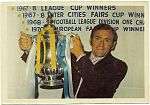Les Cocker (footballer, born 1924)
Les Cocker (13 March 1924 – 4 October 1979) was an English professional football player and coach. As a player, Cocker played as a striker for Stockport County and Accrington Stanley, making nearly 300 appearances in the Football League. After retiring as a player, Cocker became a coach, working with club sides Luton Town and Leeds United, before working with the victorious England team at the 1966 World Cup.
 Cocker holding the FA Cup in 1972 | |||
| Personal information | |||
|---|---|---|---|
| Date of birth | 13 March 1924 | ||
| Place of birth | Stockport, England | ||
| Date of death | 4 October 1979 (aged 55)[1] | ||
| Place of death | Doncaster, England | ||
| Playing position(s) | Striker | ||
| Senior career* | |||
| Years | Team | Apps | (Gls) |
| 1946–1953 | Stockport County | 173 | (43) |
| 1953–1958 | Accrington Stanley | 122 | (48) |
| Total | 295 | (91) | |
| Teams managed | |||
| 1958–1960 | Luton Town (Coach) | ||
| 1960–1974 | Leeds United (Coach) | ||
| 1962–1974 | England (Coach) | ||
| 1974–1977 | England (Assistant Manager) | ||
| 1977–1979 | United Arab Emirates (Assistant Manager) | ||
| 1979 | Doncaster Rovers (Coach) | ||
| * Senior club appearances and goals counted for the domestic league only | |||
Early and personal life
Cocker was born in Stockport on 13 March 1924.[2] During World War II, Cocker spent time with the Reconnaissance Regiment in Occupied France.[3]
Cocker was married to Nora and had three sons – David, Stephen and Ian.[3]
Career
Playing career
Cocker began his professional career with Stockport County in 1946, scoring 43 goals in 173 League games between then and 1953.[4] Cocker then played with Accrington Stanley, scoring 48 goals in 122 League games between 1953 and 1958.[5] In his professional playing career, Cocker scored a total of 91 goals in 295 League games.[2]
Coaching career
After retiring as a player in 1958, Cocker became a Coach at Luton Town.[2] In 1960 Cocker moved to Leeds United,[3] as one of the country's first FA Coaching Certificate holders.[3] In 1962, Cocker was called up by England national team manager Walter Winterbottom to become a squad trainer,[3] combining his national duties with those of his club.[6] Cocker left Leeds in 1974 to become full-time Assistant Manager to Don Revie with the English national team.[3] When Revie left in 1977 to become manager of the United Arab Emirates national team, Cocker followed as his assistant.[3] Cocker returned to England in 1979 to become a coach at Doncaster Rovers under former Leeds legend Billy Bremner, but he died in October of that year aged 55.[3]
1966 World Cup
Cocker was also a Team Trainer with the victorious England squad at the 1966 World Cup.[3][6] Despite the England team winning the competition, Cocker was not awarded a medal, and a posthumous campaign for Cocker to be awarded one was launched by his family in February 2008.[3][6] The campaign attracted support from former Leeds players including Eddie Gray, Peter Lorimer and Johnny Giles, as well as British politicians including Gerry Sutcliffe and Richard Caborn.[3][6] Cocker was eventually awarded a medal in June 2009, which was collected on his behalf by his family.[7]
References
- "Archived copy". Archived from the original on 7 July 2013. Retrieved 30 May 2013.CS1 maint: archived copy as title (link)
- "LES COCKER". Post War English & Scottish Football League A – Z Player's Database. Retrieved 23 October 2009.
- Peter Robinson (22 February 2008). "Leeds backroom stalwart medal campaign". Yorkshire Evening Post. Retrieved 23 October 2009.
- "STOCKPORT COUNTY : 1946/47 – 2008/09". Post War English & Scottish Football League A – Z Player's Database. Retrieved 23 October 2009.
- "ACCRINGTON STANLEY : 1946/47-1961/62 & 2006/07-2008/09". Post War English & Scottish Football League A – Z Player's Database. Retrieved 23 October 2009.
- Peter Robinson (7 March 2008). "Les Cocker family: It's time our great-grandad World Cup hero was honoured". Yorkshire Evening Post. Retrieved 23 October 2009.
- Matt Phillips (11 June 2009). "Boys of 1966 honoured". The Football Association. Retrieved 23 October 2009.